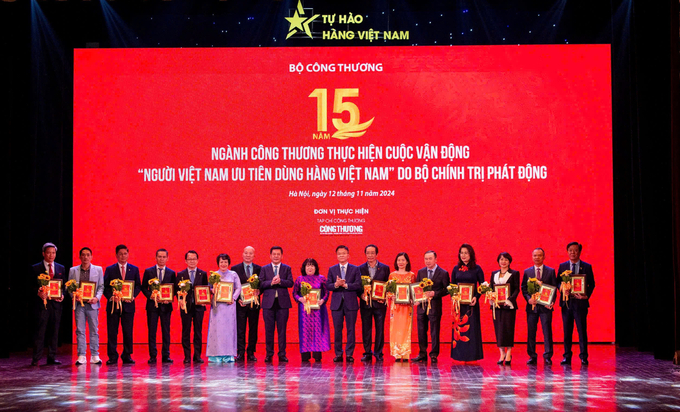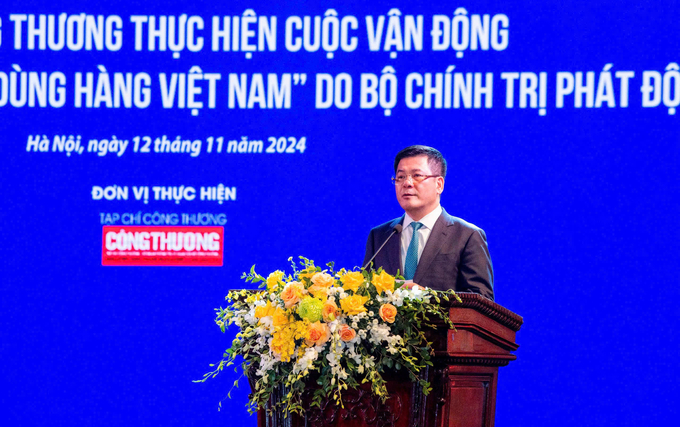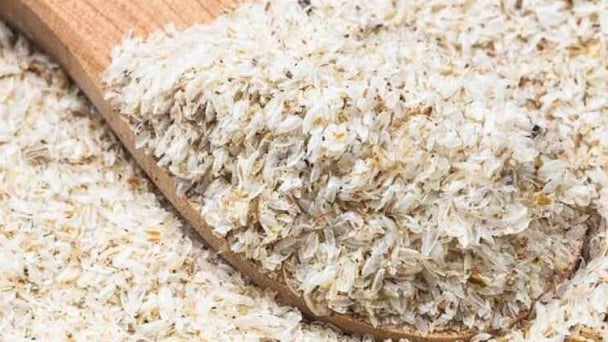May 29, 2025 | 11:59 GMT +7
May 29, 2025 | 11:59 GMT +7
Hotline: 0913.378.918
May 29, 2025 | 11:59 GMT +7
Hotline: 0913.378.918

Deputy Prime Minister Le Thanh Long and Minister Nguyen Hong Dien commended outstanding collectives and individuals in the campaign. Photo: MOIT.
On November 12, at the "15th Anniversary Gala of the Ministry of Industry and Trade's Implementation of the Campaign 'Vietnamese People Prioritize Using Vietnamese Goods'," Deputy Prime Minister Le Thanh Long commended the sector's creativity, well-structured and serious implementation of the campaign, which has yielded numerous positive results.
In the new phase of development, which is characterized by heightened globalization and international integration, the government leader emphasized the need for all levels and sectors, particularly the Ministry of Industry and Trade, to enhance the quality, designs, and prices of Vietnamese goods in order to make them more appealing to consumers on a domestic and international scale.
He urged the Ministry of Industry and Trade to fortify the organization and improve the operations of the Steering Committee for the Campaign's Action Program in order to continue achieving visible change in awareness and actions. The coordination of campaign efforts is a critical responsibility of this committee. He also underscored the significance of utilizing the lessons learned to achieve more substantial advancements in the campaign's execution, thereby improving the quality and reputation of Vietnamese commodities in both domestic and international markets, with a particular emphasis on markets with which Vietnam has signed free trade agreements (FTAs).
The Deputy Prime Minister's recommendations included improving trade promotion programs, product advertising, and supply-demand connectivity, improving market management effectiveness, and preventing illegal goods, trade fraud, and counterfeit goods. He also underscored the significance of integrating traditional trade and distribution with modern trading channels, e-commerce, and the adoption of information technology.
He also encouraged businesses to enhance the quality and affordability of their products and services by continuously conducting research, proactively modernizing technology, and implementing scientific and technical advancements. Additionally, it is imperative to prioritize the development of distribution channels and the expansion of brands in order to connect with consumers.

The Ministry of Industry and Trade has developed five key tasks for the campaign. Photo: MOIT.
In 2009, the global economic crisis that significantly impacted Vietnam's economy prompted the introduction of the "Vietnamese People Prioritize Using Vietnamese Goods" campaign. The campaign's objective is to cultivate patriotism, self-reliance, and national pride to influence consumer culture and promote economic growth, all while promoting the export of Vietnamese products.
In light of this, the Ministry of Industry and Trade has partnered with a variety of committees, ministries, and local authorities to concentrate on five primary areas: (i) promoting Party and government policies that support the campaign; (ii) reviewing support policies for manufacturing and trading enterprises; (iii) recognizing exemplary businesses and selecting high-quality products; (iv) improving market monitoring and control; and (v) increasing the accountability of agencies and organizations in protecting consumer rights.
The Ministry has also recommended that the government implement programs such as the "Domestic Market Development Plan Linked to the Campaign," the "Domestic Trade Development Strategy," the "Plan to Promote Vietnamese Businesses' Participation in Foreign Distribution Networks," the National Trade Promotion Program, and the National Industrial Promotion Program.
It is important to note that the Ministry of Industry and Trade has implemented policies and mechanisms to promote the growth of fundamental industries, including energy, processing, manufacturing, chemicals, and novel materials. Furthermore, they assist small businesses in the establishment of a comprehensive industrial ecosystem for the future and encourage large economic corporations to lead the industry.
In this advantageous business environment, numerous enterprises have made investments in the development of import-substitute products, which has fostered a culture of competition that is predicated on the quality of their products. Provinces have also organized a variety of events to promote the sale of Vietnamese goods, aligning the campaign with market stabilization efforts and establishing modern distribution systems that prioritize Vietnamese products.

High-quality Vietnamese products such as OCOP products are increasingly trusted by consumers. Photo: Le Hoang Vu.
In recent years, there has been systematic and pervasive support for consuming Vietnamese products on e-commerce platforms. The efficacy of market monitoring, consumer rights protection, and information dissemination initiatives has increased.
Vietnamese businesses' more systematic and effective market approach has garnered greater appreciation from consumers for the quality and brand repute of Vietnamese goods.
After 15 years of campaign implementation, the annual growth rate of the total retail sales of products and services has been approximately 10%. The CPI index, which experienced excessive inflation at 19.8% in 2008, has declined to below 5% since 2014. Since 2016, there has been a consistent trade surplus, and the trade deficit has decreased. Vietnamese products now comprise over 80% of supermarkets and over 60% of traditional retail channels.
Vietnam has also become more thoroughly ingrained in the global supply chain. As per the VCCI, the percentage of foreign direct investment (FDI) companies that utilized Vietnamese commodities and services as inputs increased significantly from 12.4% in 2010 to 63.3% by 2023.
Translated by Linh Linh

(VAN) The import-export turnover between Vietnam and Singapore rose amid a trade rebound, with machinery, electrical equipment, and fuels making up the majority of the transaction value.

(VAN) Director General of the General Administration of Customs of China, Ms. Sun Mai Jun, has pledged to implement measures that will ease the import process for Vietnamese agricultural products.

(VAN) Although Vietnam is still increasing its coffee exports, the industry is currently in the process of determining market strategies in response to the U.S. imposition of reciprocal tariffs.

(VAN) With rising demand in Muslim-majority countries, Halal certification is becoming a critical passport for Vietnamese agricultural products seeking sustainable market access and consumer trust in the Middle East and Africa.

(VAN) Vietnam’s fruit and vegetable exports to the U.S. are rising sharply, and exporters are hoping that any upcoming reciprocal tariffs will be set at manageable levels.

(VAN) Despite meeting quality standards, Vietnamese rice bran exporters still face difficulties with administrative procedures under the new protocol.

(VAN) The U.S. is tightening import tariffs and origin inspections, requiring Vietnamese businesses to proactively prepare in terms of legal compliance, supply chains, and appropriate export strategies.